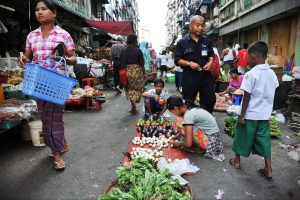Myanmar’s economic performance will remain “feeble” this year due to intensifying conflict and the military junta’s compulsory conscription drive, according to the World Bank.
In its latest Myanmar Economic Monitor, released yesterday, the Bank predicted that Myanmar’s gross domestic product will grow by just 1 percent in the financial year ending March 2025, down from its forecast of 2 percent in December.
“The downward revision in projected growth for 2024/25 is largely due to the persistence of high inflation and constraints on access to labor, foreign exchange, and electricity, all of which are likely to have larger impacts on activity than was previously expected,” the report stated.
Even then, economic output is expected to remain about 9 percent below 2019 levels, “in sharp contrast to the experience of other large economies in the region.”
All of this points to the various mutually inflaming economic diseases that are afflicting Myanmar’s economy, most of which can be directly connected to the coup d’etat of February 2021 and the subsequent intensification of the country’s civil war.
What is striking about the Myanmar Economic Monitor’s data is how much the situation has deteriorated over the past year. Since October, the military junta has experienced reversals across the country’s periphery, losing swathes of territory and control of several of the country’s most important border crossings and overland trade routes into China, Bangladesh, and India.
As the conflict has spread, the number of civilians displaced since the February 2021 coup has tipped over 3 million, increasing poverty rates to 32.1 percent, comparable to 2015 levels, according to the World Bank. It is estimated that there are 7 million more people living in poverty in Myanmar than there were prior to the COVID-19 pandemic.
“Displacement, job losses, and income losses have wiped out much of the previous progress in poverty reduction,” Mariam Sherman, World Bank country director for Myanmar, Cambodia, and Laos, said in a statement accompanying the report’s release. “The economic outlook remains very weak, with little respite for Myanmar’s households over the near to medium term.”
The military council’s conscription plan, announced in February in a bid to replenish its thinning ranks, has suddenly made a quarter of the prime working-age population eligible for enlistment. This “has intensified migration to rural areas and abroad, leading to increased reports of labor shortages in some industries,” the World Bank said.
At the same time, the kyat, which has been in steady decline since the coup, has plumbed new lows as those with the means seek out the security of the country’s small supply of U.S. dollars. In late May, the kyat hit a record low of 4,500 kyat to the U.S. dollar on the black market, Reuters reported last week, compared with around 1,300 at the time of the military takeover. This has prompted the junta to launch a crackdown on illegal currency and gold traders.
This along with the recent eruption of fighting in border areas has also seen a significant dip in overland trade. “Excluding natural gas, exports through land borders declined by 44 percent,” the report stated. “Imports via land borders declined by half, accounting for 71 percent of the decline in overall imports.” This contributed heavily to the shrinking of merchandise exports, which fell by 13 percent to March, compared to the same period a year earlier, and imports, which dropped by 20 percent over the same period.
Given this weight of challenges, even posting positive growth in the upcoming year seems like an optimistic projection. Also this week, BMI, a unit of Fitch Solutions, predicted that the country’s economy would actually shrink in the coming fiscal year. “The situation has worsened notably since October, leading to our projection of a 0.2 percent contraction in the economy for the current fiscal year,” it stated in a report released on June 10. “Significantly, this would result in an economy that is 20 percent smaller compared to its size in fiscal year 2020.”
All of this suggests that the coup and the subsequent intensification and expansion of Myanmar’s civil war are returning the country’s economy to the moribund dysfunction prior to 2010. Whether this will eventually undermine the military’s ability to fight is uncertain, but it is clear that as long as the conflict continues, there is little relief on the horizon for Myanmar’s people.

































